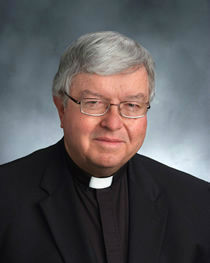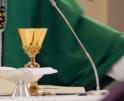
Faith
Church custom over the years has extended that reverence to all articles blessed for devotion, even if not used in a liturgical context. The general practice when disposing of blessed articles such as rosaries, statues or medals has been to burn them or to bury them.

Doyle
Q. What is the proper way of disposing of a wedding ring that is no longer wanted? Many years ago, I was married in a Catholic church, and our rings were blessed as a part of the wedding ceremony. Some years later, I was divorced, and the marriage was annulled by the Catholic Church. Since that time my wedding ring has sat in my jewelry box as I have never been sure what to do with it. Several years after the annulment, I married another woman in a Catholic ceremony, and that union remains to this day. At this point, I want to clean out my jewelry box and get rid of the ring from my first wedding. What options do I have? (City of origin withheld)
A. Surprisingly, church law on disposing of blessed objects is not very specific. Number 1171 of the Code of Canon Law simply says that "sacred objects, which are designated for divine worship by dedication or blessing, are to be treated reverently" and are not to be used in inappropriate or profane ways.
Church custom over the years has extended that reverence to all articles blessed for devotion, even if not used in a liturgical context. The general practice when disposing of blessed articles such as rosaries, statues or medals has been to burn them or to bury them. However, if an article has been substantially damaged and can no longer be used for the religious purpose intended, it is commonly thought to have lost its blessing.
Since your ring was blessed as a sign of the lasting love between you and your first wife, I would argue that it no longer serves its original religious purpose. (The priest at a wedding ceremony prays that "these rings be a symbol of true faith in each other and always remind them of their love.") My view is that you are free to do what you want with the ring -- perhaps donate it to a charity.
Q. I understand that, as Catholics, if we choose to be cremated our cremains are to be treated with dignity and must be buried or entombed. My husband and I have two family members who have asked us to arrange to have their ashes "scattered." One is a Catholic, one is not. Does our duty to follow church teaching on this matter override the wishes of our family members (even of the non-Catholic one)? I am uncomfortable with one day having to carry out their request, but I'm unsure as to how to respond. (Staunton, Virginia)
A. You are correct on the church's teaching. Although the Vatican in 1963 lifted the ban on cremation, the church specifies that cremated remains are to be treated with the same reverence as the body of a deceased person. This means that the cremains are to be placed in a worthy vessel and, following the religious services, to be buried or entombed in consecrated ground.
They are not, for example, to be kept on a mantelpiece or scattered in the deceased's favorite park. Your duty as faithful Catholics overrides the desire of your family members. I see no philosophical justification for distinguishing between the Catholic relative and the non-Catholic. The church's reverence for the remains of each of them is equal. (My guess is that you would also buy yourself some extra family trouble if you distinguished.)
I think this is a "teachable opportunity" for you. You should tell each of the two that, as a faithful Catholic, you would feel (in your words) "uncomfortable" carrying out their wishes and then go on to explain to them the reason for the church's guidelines (i.e., reverence for the cremated remains).
- Father Kenneth Doyle is a columnist for Catholic News Service
Recent articles in the Faith & Family section
-
Ascended into heavenJaymie Stuart Wolfe
-
May is packed with joy, meaning and mystical wonderBishop Robert Reed
-
The Eucharistic PrayerFather Robert M. O’Grady
-
Celebrating Mothers in the MissionsMaureen Crowley Heil
-
The kingdom remainsScott Hahn


















